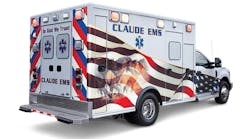Tennessee Tech is taking back is glider kit claims.
The university recently admitted “certain conclusions” in its controversial study examining glider kit emissions, which was paid for by Fitzgerald Glider Kits—the country’s largest builder of glider kit trucks—were “inaccurate.”
The June 2017 study concluded that pollution produced by “super-polluting” diesel glider trucks was no worse than the pollution coming from trucks with modern emissions controls. It was cited by outgoing EPA administrator Scott Pruitt in his 11th-hour decision to stop enforcing production caps on glider trucks.
That decision later was rescinded by acting EPA head Andrew Wheeler.
“The university has concluded its internal investigation and has found that certain conclusions reported in the June 2017 letter were not accurate,” wrote Trudy Harper, vice chairman of the university’s board of trustees, in a letter sent to Sen. Diana Black, the EPA and Tommy Fitzgerald, CEO of Fitzgerald Glider Kits on Oct. 23.
The original letter stated “The results of the emissions test were compared with the 2010 EPA emissions standards for HDVs. Our research showed that optimized and remanufactured 2002-2007 engines and OEM ‘certified’ engines performed equally as well and in some instances out-performed the OEM engines.”
So, how do school officials feel about the veracity of their research now?
“The university has determined that this statement is inaccurate in two respects,” Harper said.
“First, the field-testing procedures used by Tennessee Tech in this research effort were not sufficient to justify comparisons with EPA emissions standards. Second, following a review of the supporting data for these statements, Tennessee Tech has determined that the data does not support the statement that optimized and remanufactured engines performed equally as well as OEM ‘certified’ engines.”
The most recent letter follows an investigation after the university was criticized by industry stakeholders who disagreed with Fitzgerald using the study as the basis for its argument to exempt glider kids from the EPA’s Phase 2 greenhouse gas emissions regulations, which Pruitt cited in his decision.
In the July reversal by Wheeler, the EPA said the 300-truck per manufacturer cap on glider kits will remain in place.
While admitting to flawed conclusions, the university did maintain the research was “methodologically sound, and that the methods, methodology and measurements used were appropriate for the project based upon the project's original intent,” which was to “conduct relative comparisons of emissions from OEM engines and engines remanufactured with the sponsoring company's glider kits.”











